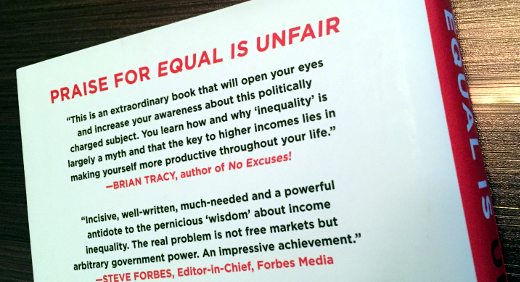With your question, “is the goal for everybody to be equal, or to have the opportunity to be all the want to be?” are you supporting the later?
My Takeaways From The Book Equal Is Unfair
This past spring I attended a debate held by Chicago Ideas Week between Dr. Yaron Brook, the executive director of the Ayn Rand Institute and Dr. James Galbraith, an economist and professor at the Lyndon B. Johnson School of Public Affairs at the University of Texas, on the topic “Is Equal Fair?” Where it was a debate about a heady topic, there was a good connection with the audience on the subject of equality and inequality in our society.
As someone who owned his own business and believes my success and failures are my own doing, despite all outside factors and influences, I personally take a more conservative look at this topic. That being said, I came into this debate with an open mind and was interested in hearing both sides to see how either could influence my thinking. In my humble opinion, Brook won this debate not only on substance but in style and how he presented complex economic models in simple terms.
After the debate I bought a copy of the book Brook co-authored with Don Watkins, an Ayn Rand Institute fellow, titled Equal is Unfair as I was interested in reading more on the points Brook made during the debate. As I expected, it is a very comprehensive book, with economic charts and data. However, it has an interesting and engaging narrative that explains well to the non-numbers person like myself without taking anything away from the topic.
As I read Equal Is Unfair, there were a few overarching takeaways I took from it, including:
Nothing Is Ever Equal – Other than a well-formed math equation, it is hard to say that all things are truly equal in the world, or can be. Many people have advantages in one area over others where they may have disadvantages in other areas with the same people. Especially in an ever-changing world, it’s hard to predict everything and keep things in equal, especially when there are unpredictable and unanticipated forces that may come along and have a negative impact, at first, and from which someone may recover or not.
By artificially trying to make something equal that naturally isn’t, it is simply going against a tide that is hard to maintain. Rather, do you look for another way, a Plan B, to gain advantage as compensation? For myself, I don’t look at being equal as the end goal.
What Do You Really Want? – The idea of equality is discussed in the book, as it was in the debate, to bring people in line with others who have better access to resources or information. To this end, I think to myself… is the goal for everybody to be equal, or to have the opportunity to be all the want to be?
Consider the Ripple Effect – Efforts to make all things equal may have unforeseen consequences, such as costs incurred or diverted, that have to be paid for somehow from somewhere. Anything new will have an impact on time and resources which are not infinite.
Whatever side you are on this issue or whatever your political and societal positions are on the topic of equality, I recommend reading Equal Is Unfair for a unique point of view on this topic.
This is from The Hot Iron, a journal on business and technology by Mike Maddaloni.
Did you enjoy this? Subscribe to The Hot Iron by RSS/XML feed or Read by Email.
Book Take-Aways • Strategize • (6) Comments • Permalink
Comments
I find the topic of equality to be fascinating. Thank you for sharing your key takeaways on the book.
on 11/27/16 at 12:45 PM
@Matt - Yes, I personally support the latter.
@Jen - You’re welcome!
And both, thanks for reading!
mp/m
Huh, I never really saw the liberal side as saying that all wealth for all people has to be equal. I always understood it as being that everyone should have equal opportunity. Perhaps there’s a danger in painting the liberal side as wanting everyone to be equal. When liberals really want everyone to have equal opportunity. Now how we define what that equal opportunity to be is what the debate really is about.
I should read about Dr. James Galbraith to see what he says with this people being equal thing is about.
I really like that these issues are being publicly debated by people who are able to talk coherently about the issue. A few years ago there was no discussion about the correctness or incorrectness of the politically correct view that if everything was fair then everything would have to be equal. It was automatically assumed that if there was sub smidgen of inequality—even if it was three generations ago in your ancestors—then it was unfair. Now at least we are free to discuss if this view is right or wrong.
I attended the same talk and I have to agree: Brook won in his handling of debate, on both style and content. There must be some professors who believe strongly that he is wrong. I like Galbraith but hopefully we will hear a better defense of the “equal is fair” position next time.
on 11/27/16 at 08:08 PM
@Daniel - Thanks for reading and sharing your comments. It is good to have these types of discussions - equality is by no means a sound-byte topic, and it, as well as all similar discussions, need the proper time to discuss.
mp/m
Post a Comment
Note: Comment moderation is active, and your comment will be viewable once it is reviewed.




